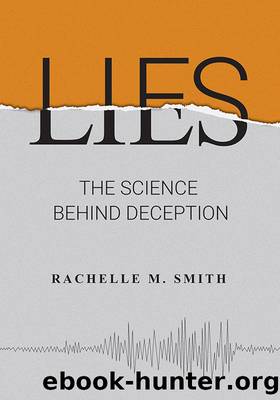Lies: The Science Behind Deception by Rachelle M. Smith;

Author:Rachelle M. Smith;
Language: eng
Format: epub
Publisher: ABC-CLIO
Published: 2022-03-14T16:00:00+00:00
L
Language
Which words a liar chooses to use may be a key in decoding deception. Researchers have proposed several models of language use that may help detect deceptive attempts. Two such models include the Cognitive Strain Model and the Strategic Model. Furthermore, Dr. James W. Pennebaker, a social psychologist and professor of psychology at the University of Texas at Austin has revealed consistent differences in the content of deceptive statements as compared to honest reports using his Linguistic Inquiry and Word Count (LIWC) software. Deceptive statements tend to differ in pronoun use, use of emotion words, and use of words that indicate level of cognitive complexity.
The Cognitive Strain Model suggests that language is already a complex process, and anything that adds to our cognitive load will decrease the complexity of our speech. Thus, when people attempt to deceive others, the complexity of language decreases due to the increased cognitive load needed to create a false reality. In a host of psychological experiments, individuals who were instructed to lie used fewer descriptive words and more concrete verbs that revealed more simplistic thinking. The cognitive resources needed to lie convincingly took away from the resources needed to engage in complex linguistic communication.
Alternatively, the Strategic Model suggests the liars use complexity or simplicity in a strategic manner and vary their speech depending on what will be most effective in the given situation. Individuals in a psychological experiment decreased complexity when discussing alternative viewpoints but increased complexity when elaborating on the viewpoint about which they were lying. When attempting to deceive a naive individual, liars tended to use less complex language. When attempting to deceive a suspicious individual, however, liars used more complex language.
To examine lying in real-world scenarios, researchers analyzed past political speeches from John F. Kennedy and Richard Nixon. When lying, these politicians used more elaborative complexity but less logical reasoning. These same patterns were found when analyzing university students, providing evidence that the Strategic Model may be a better descriptor of the language of lying, at least when the liars have time to prepare their statements. Liars who have prepared their lies in advance rely less on immediate cognitive resources, whereas liars who must create their lies in real time may experience greater cognitive strain.
To analyze language use, Dr. Pennebaker developed the Linguistic Inquiry and Word Count (LIWC) software. The LIWC software is a text analysis program used to examine oral and written statements to search for differences in language use in honest versus deceptive communication. Use of the software revealed that deceptive attempts include very specific patterns that differ from honest accounts. Liars express more negative emotion words, particularly anger and denial, than truth-tellers. Liars also distance themselves more from the events being discussed by using fewer first-person pronouns and self-references than truth-tellers. Finally, liars refer less often to cognitive processes than truth-tellers and use fewer exclusionary words and more motion verbs, illustrating lower complexity in their speech. However, liars expressed the same level of certainty as truth-tellers. These findings were
Download
This site does not store any files on its server. We only index and link to content provided by other sites. Please contact the content providers to delete copyright contents if any and email us, we'll remove relevant links or contents immediately.
Spare by Prince Harry The Duke of Sussex(4762)
Machine Learning at Scale with H2O by Gregory Keys | David Whiting(3514)
Fairy Tale by Stephen King(2897)
Will by Will Smith(2554)
Hooked: A Dark, Contemporary Romance (Never After Series) by Emily McIntire(2406)
The Bullet Journal Method by Ryder Carroll(2355)
Rationality by Steven Pinker(2137)
Can't Hurt Me: Master Your Mind and Defy the Odds - Clean Edition by David Goggins(1986)
Friends, Lovers, and the Big Terrible Thing by Matthew Perry(1968)
It Starts With Us (It Ends with Us #2) by Colleen Hoover(1958)
The Becoming by Nora Roberts(1887)
Love on the Brain by Ali Hazelwood(1757)
HBR's 10 Must Reads 2022 by Harvard Business Review(1686)
The Strength In Our Scars by Bianca Sparacino(1682)
A Short History of War by Jeremy Black(1657)
515945210 by Unknown(1507)
Leviathan Falls (The Expanse Book 9) by James S. A. Corey(1482)
Bewilderment by Richard Powers(1412)
443319537 by Unknown(1381)
